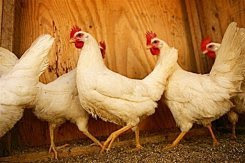 What’s the difference between a huge and heavily populated industrialized nation and a group of smaller, more traditional countries that band together and take great measures to protect their publics’ health and their environment? What’s the difference between a country whose system sometimes encourages profiteering, even at the risk of public safety, and a de facto confederation that refuses to embrace “modern” food processing practices without question? If you answered, “a whole heckuva lot,” you’d be right.
What’s the difference between a huge and heavily populated industrialized nation and a group of smaller, more traditional countries that band together and take great measures to protect their publics’ health and their environment? What’s the difference between a country whose system sometimes encourages profiteering, even at the risk of public safety, and a de facto confederation that refuses to embrace “modern” food processing practices without question? If you answered, “a whole heckuva lot,” you’d be right.
Take for instance poultry preparation. In the U.S. it is common practice to wash freshly butchered chicken carcasses in a chlorinated wash to disinfect them of Salmonella, E. coli and Campylobacter, common causes of food poisoning. Salmonella and E. coli are particularly dangerous to humans, so this practice seems prudent, right? Add to that the cost effectiveness of using chlorine (it’s cheap!) and what you’ve got is a nifty little tool for mass chicken consumption. That’s what makes this country great. Everybody eats and somebody profits. Nice.
In that old fashioned land of Europa they do things a little differently. For instance, they refuse to use chemicals to clean and disinfect a carcass. Cave people. They believe instead that hygiene controls throughout the hatching and rearing cycle to better ensure that the bacteria does not develop in the first place. How yesterday. And they are very adamantly rejecting a proposed lifting of a decade-old import ban on poultry products from the U.S.
Of course, some people and some groups are muy pissed off, like, for instance, American poultry farmers. You don’t say. And a couple European folk are PO’d, too. Like EU Industry Commissioner Guenter Verheugen, who promised his buds in the U.S. that he would work to get the ban lifted. Hey, wouldn’t you be a bit annoyed if you were losing $180 million a year? I would. So, why can’t those sore sports just buck up and buy our chickens?
According to British lawmaker John Bowis, lifting the ban would be “outrageous and unacceptable, and would degrade EU citizens to guinea pigs.” Most vocal against lifting the ban is Europe’s biggest poultry producer, France. According to French Agriculture Minister Michel Barnier, “The Americans don’t have to buy our chickens (and) we don’t have to accept theirs.” Amen, mon ami, and you don’t have to accept American genetically modified foodstuffs, either.
We shouldn’t be so brazen about using chemicals (or molecular biology) to disinfect our foods; not until we understand all the risk involved, anyway. I’m all for progress, and lord knows, the risks of infected poultry isn’t something to play around with.* But I’m of the opinion that cleanliness starts in the chicken coop, and in this matter, American poultry farms are severely lacking (I talk in depth about this subject in my book, The Six Keys To Optimal Health). Further, there appears to be other options with regard to disinfecting carcasses which are supposedly a little safer. Whether or not this is true, I still tend to side with the Euros on this one: When it comes to the health and safety of my family’s foodstuffs, I rather not mess with chemicals if I don’t have to. Keep food production plants clean to the highest standards, and never, ever, ever let profits dominate public policy when it comes to our health.
*To be fair, here is an excellent piece on the risk cost-benefit analysis in favor of using chlorine to disinfect poultry and poultry preparation stations in production houses–pretty hard to argue with this writer’s reasoning.












